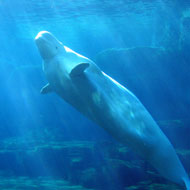Virgin Holidays announces new policy on cetaceans

Research suggests lack of space can cause abnormal behaviour, heightened anxiety and aggression.
Travel company Virgin Holidays will no longer promote new attractions or hotels that feature captive whales and dolphins for entertainment purposes.
The commitment forms part of a new policy published by the business, which has also pledged to ensure its existing contracted facilities displaying captive cetaceans, meet the highest animal welfare standards. Additionally, they will be encouraged to change their exploitative practices.
Virgin Holidays said it will support the creation of coastal sanctuaries for whales and dolphins, and promote conservation in their natural habitats. The company also endorsed international co-operation to end the capture of wild cetaceans, and to discourage the building of any new attractions where cetaceans will be used for theatrical or contact purposes.
The policy has been described as “a potential game-changer” by the Born Free Foundation.
Daniel Turner, the charity’s associate director of tourism and EU compliance, commented: “The keeping of whales and dolphins in captivity, their use in theatrical performances and contact sessions, and their confinement in barren tanks, is no longer supported by science, nor accepted by an increasingly concerned public.”
The pledge to support coastal refuges was particularly welcome as these are seen as the most progressive alternative to barren tanks, the charity added. Together with partners, it is considering a number of plans to create seaside sanctuaries in different locations around the world.
According to Born Free figures, 360 dolphinaria around the world keep approximately 2,000 dolphins, 230 beluga whales, 56 orca, 37 porpoises and 17 false killer whales.
Research suggests that, in the majority of cases, the animals’ tanks are a fraction of the size of their natural home range and lack of space can cause abnormal behaviour, heightened anxiety and aggression. So too can a lack of environmental quality and complexity in the tank. In addition, limited social integration between unrelated individuals, often from different origins, can result in aggression, injury, illness and even death.
Born Free president Will Travers said: “Born Free is keen to collaborate to create a fresh vision that combines fantastic tourism experiences, based on respect and compassion, with securing a future where wild cetaceans can thrive in their natural habitat for generations to come.”



 The BSAVA has opened submissions for the BSAVA Clinical Research Abstracts 2026.
The BSAVA has opened submissions for the BSAVA Clinical Research Abstracts 2026.